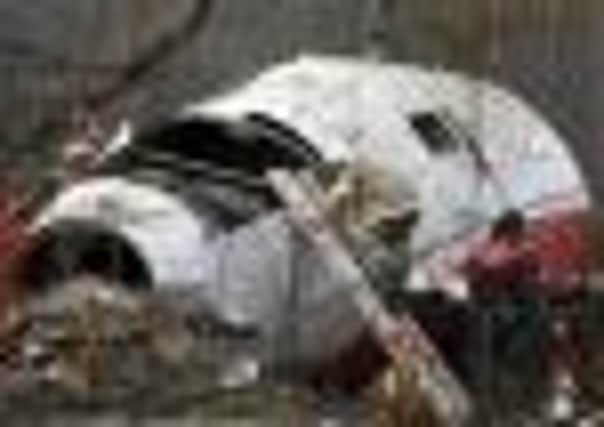Rumours of complicity mar events to mark Polish air disaster


Donald Tusk, the Polish prime minister, led official ceremonies yesterday to commemorate the crash of the government Tupolev Tu-154 in Russia on 10 April, 2010, which, along with claiming the lives of the presidential couple, cut a swath through Poland’s political, military and civil elite.
But the brief period of national unity fostered by the disaster has long since been swept aside by a persistent torrent of allegations and rumours surrounding the crash, many of them accusing the Polish government of complicity in the disaster or even organising it.
Advertisement
Hide AdAdvertisement
Hide AdAs testament to the rawness of the wounds, Jaroslaw Kaczynski, twin brother of the late president Lech Kaczynski and a former prime minister, boycotted official events preferring to mark his brother’s passing at ceremony outside Warsaw’s presidential palace.
Mr Kaczynski has called the crash an assassination and accused the government of hiding the truth of what really happened at Smolensk.
“We have the right to have the truth and the right to struggle for it,” an emotional Mr Kaczynski told his supporters yesterday. “We continue because there are millions of Poles who will not accept the manipulation.”
Despite official Russian and Polish reports attributing the crash to factors such as pilot error and bad weather, Mr Kaczynski and his supporters have spoken of murder, bombs and even the use of artificial fog released by the Russians to confuse the Tupolev’s pilots.
The never-ending river of conspiracy theories over the disaster has found fertile soil in Poland, a country whose history has often been affected by secret decisions made beyond its control. Opinion polls now show that some 33 per cent of Poles “would not exclude the possibility of assassination”.
Yesterday, Antoni Macierewicz, a close party colleague of Mr Kaczynski and leading protagonist of the assassination theory, presented a report that claimed that “the catastrophe followed explosions” on board.
“For three years we’ve watched the government of Donald Tusk making great efforts – including financial – to make sure it doesn’t find the perpetrators,” he told a press conference. “For three years we’ve watched the hopelessness of the prosecution.”
Marta Kaczynska, daughter of the late president, said that “we are getting closer to knowing the full circumstances behind the crash because of key evidence still in Russia.”
Advertisement
Hide AdAdvertisement
Hide AdRussia has always denied any involvement in the crash, and stood by its report, which laid the lion’s share of blame on pilot error.
However, the constant warring over the crash, which has meant that almost not a day has gone by in the past three years without a Smolensk story in the press, has wearied many Poles, and left people frustrated that a traumatic event in the nation’s history has become a political football.
In an appeal for reconciliation Mr Tusk said: “I believe that there will come a time when Poles can reflect and pray on this tragedy without negative emotions.”